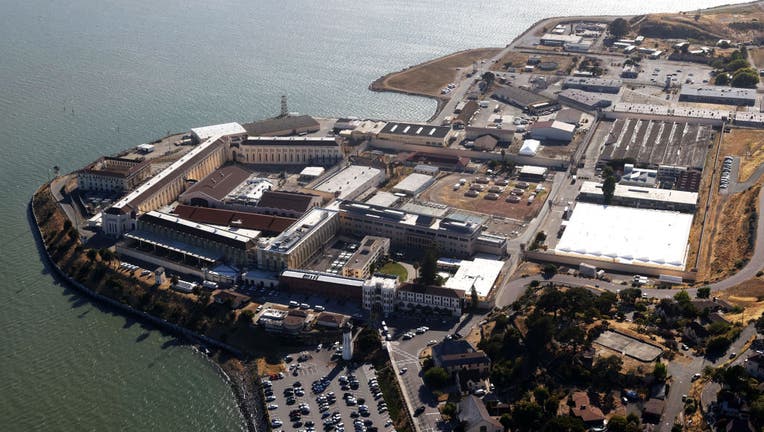California prisons take no 'meaningful steps' to reducing San Quentin population: attorneys

SAN QUENTIN, CALIFORNIA - JULY 08: An aerial view San Quentin State Prison on July 08, 2020 in San Quentin, California. Over 1,400 inmates and staff at San Quentin State Prison have become infected with coronavirus COVID-19 after inmates from a Chino (Getty Images)
SAN QUENTIN, Calif. - Ahead of a big court showdown next week, public defenders representing about 300 people incarcerated at San Quentin and the state Attorney General representing California's prisons submitted their last written arguments to a judge who will decide what to do about a situation that has resulted in 2,200 COVID-19 infections and 28 deaths at that prison alone.
In court briefs filed Monday, public defenders from Marin County, San Francisco and the private firm, Keker, Van Nest and Peters in San Francisco, told Marin County Superior Court Judge Geoffrey Howard that the California Department of Corrections and Rehabilitation "has not yet taken any meaningful steps toward promptly reducing the population of San Quentin by 50% (or 1,097 prisoners)," as ordered by the First Court of Appeal last month.
Specifically, in the last month, CDCR has only reduced San Quentin’s population by 112 prisoners. As of this week, San Quentin is at 93% capacity and the overall prison system is at 106% capacity.
"This is not nearly fast enough, particularly given the spike in COVID-19 cases in California and throughout the country," the inmates' attorneys wrote on behalf of the 300 people incarcerated at San Quentin who are asking to be released due to the pandemic. "Simply put, CDCR has repeatedly proven that it cannot be trusted to protect the health of the prisoners in its charge."
- Formerly incarcerated Emeryville man explains why many at San Quentin don't want to be transferred
- California AG fights back on request to release hundreds of incarcerated people from San Quentin
The attorneys for the incarcerated men also alleged that CDCR has also ignored a court order to provide “a detailed explanation” of its plan to comply with the appellate court ruling, which mandated in October that the population at San Quentin be reduced to no more than 1,775 inmates -- either by transferring them somewhere else or releasing them.
Instead, the CDCR has only offered vague responses that it will give "alternative housing" to medically high-risk inmates" and "there is nothing to suggest that CDCR is making progress toward that goal," the lawyers wrote.
That is not how the prison system sees it.
California Attorney General Xavier Beccera and his team, who are representing the state's prison system, have argued that it is indeed safe at San Quentin and that CDCR has already reduced the prison population by more than 17,000 people since March. Their main argument is that they would prefer to transfer incarcerated people to different prisons to reduce the population at San Quentin, and not simply release them into the public.
And in its final brief, also filed on Monday, the AG's Office argued that a judge should not decide who is eligible for release, but rather, the prison system should. And it is unreasonable, they argued, to conduct individual assessments on each of the 300 inmates, while also arguing that a prisoner's mental health should not be taken into account into who should be released from custody.
Reviewing the individual circumstances of each person "is not a worthwhile effort," the prison lawyers argued.
Further, the AG's Office pointed out that the lawyers for the incarcerated men got some of the individual information about each of the inmates incorrect, like their age or where they are living, so the information should not be fully trusted. The AG's Office also said that according to their data, 66% of those who want to be released don't have significant COVID-19 risk factors and "therefore are not considered high risk."
An evidentiary hearing is scheduled for Monday, where the judge will decide on the next steps.
Lisa Fernandez is a reporter for KTVU. Email Lisa at lisa.fernandez@foxtv.com or call her at (510) 874-0139. Or follow her on Twitter @ljfernandez.

